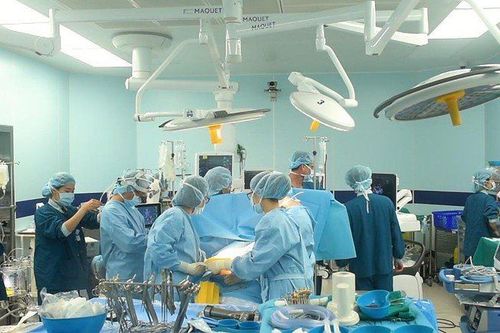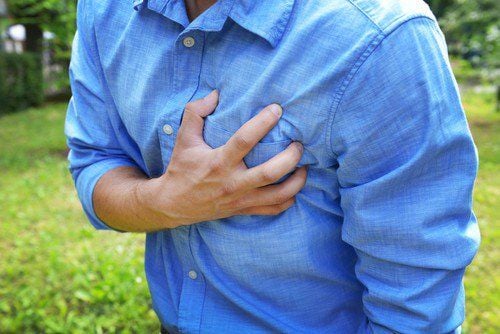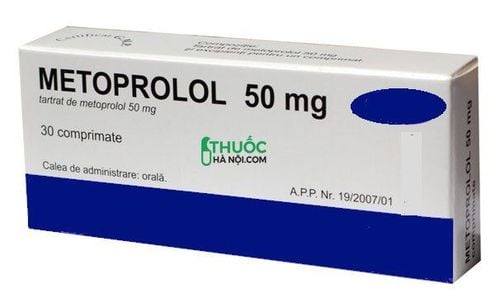This is an automatically translated article.
The article was professionally consulted by Specialist Doctor I Nguyen Duc Vien - Cardiologist - Cardiovascular Center - Vinmec Central Park International General HospitalOpen heart valve repair surgery is a type of surgery to repair faulty heart valves, which is applied to correct defective heart valves due to stenosis, obstruction or reflux, leakage.
1. What is open heart valve repair?
Open heart surgery is one of the classic surgeries in the treatment of cardiovascular diseases. Open heart surgery to repair heart valves to repair faulty heart valves. Open heart surgery repairs heart valves that are defective due to stenosis (stenosis/obstruction) or reflux (leakage). This is the type of surgery that repairs a faulty heart valve. If the valve cannot be repaired, doctors will replace it with a biological (human or animal) or mechanical (artificial) valve.
People with valvular heart disease can still have a near-normal life if detected early, with a reasonable medication regimen and regularly checked. But if the heart valve is severely damaged, there is a risk of heart failure, the patient needs surgical intervention to stop the progression of the disease.
In some cases, when the damage to the valve is not too much, the doctor can repair the heart valve to reduce the narrowing or regurgitation. In case the heart valve is too damaged to be repaired, it must be replaced.
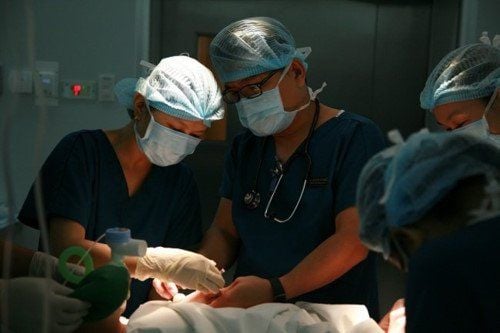
Phẫu thuật sửa van tim được áp dụng phổ biến
Open heart surgery to repair heart valves promises to improve the quality of life for patients. After surgery, most patients have a good progress, can do things that they were not able to do before surgery. Your health can improve every day for 3 to 6 months, in some cases it can take up to 1 year. Recovery is highly dependent on the patient's physical activity regimen and adherence to treatment.
2. Is heart valve repair surgery dangerous? Benefits and risks?
In cases where the heart valve is narrowed due to sticking only the valve edges, the patient's condition can be resolved by cutting and fixing the adhered valve edges.
In the case of heart valve regurgitation, depending on the mechanism causing the opening, the surgeons will have different treatment methods such as: Cutting, stitching too long ligaments, placing "belts" around the valve ring to narrow the diameter. The valve ring helps the valves to close together.
The benefit of heart valve repair is that the patient's natural valve tissue is preserved, so the risk of valve infection or anticoagulation after surgery will be greatly reduced. The advantage of this open-heart surgery method is that it gives the doctor easy access to the heart and its internal structures.
However, the disadvantage of open heart surgery is that the incision is large, the patient has a lot of pain, a lot of blood loss, and the recovery time is longer. In particular, patients with open surgery may experience dangerous complications of sternum infection, requiring long-term hospitalization.
3. Complications after heart valve repair surgery
Open heart surgery is one of the most complex surgeries in the treatment of cardiovascular diseases. Open surgery often has large incisions so the recovery time is longer than laparoscopic surgery.
Common complications after surgery include: Complications of pericardial infection, thrombosis, arrhythmia, anesthesia events...
In particular, notable complications of open-heart surgery is a sternum infection, this is a complication with a low rate (<1%) but when it occurs, it increases the risk of death by 30-50%, and the length of hospital stay is prolonged.
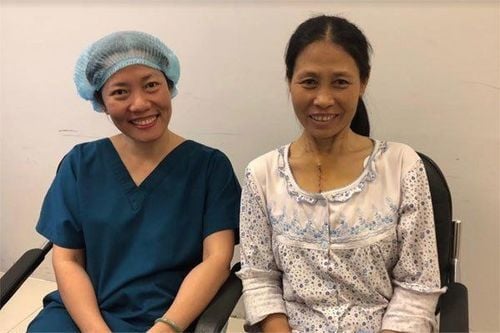
Bệnh nhân sau khi phẫu thuật sửa van tim tại Bệnh viện Đa khoa Quốc tế Vinmec
4. What cases need open heart surgery?
Although open heart valve surgery has many dangerous risks, but in case it is necessary to repair the heart valve, when it cannot be done with other treatment methods, doctors will still appoint the patient for surgery.
Mild valvular regurgitation can be treated with medication combined with a reasonable diet and lifestyle change without surgery. However, if the valve regurgitation is severe with symptoms of shortness of breath, fatigue, chest pain, palpitations, edema, etc., then you may have to undergo surgery to replace the heart valve or repair the heart valve.
After choosing a valve replacement option suitable for the economy and medical condition, the choice of valve type is equally important. There are two types of valves: mechanical valves and biological valves.
5. How long does it take to wake up after heart surgery?
During the surgery, under the effect of anesthesia, the patient will sleep very deeply, feel no pain and do not remember anything about the surgery. After surgery, the patient will be transferred to the recovery room to monitor the progress of postoperative health.
Usually, the patient will wake up gradually in about 2 hours or so from the end of surgery, depending on the health status of each person. Some patients also have a condition where they can hear or open their eyes but cannot move their limbs, which is normal after surgery because the body is still under the influence of anesthesia. When the drug wears off, the patient can return to normal movements.
6. How long do heart surgery patients live?
After heart surgery, patients need to be cared for and monitored for their health to gradually recover. The patient's life expectancy depends on many factors such as health status, heart function, risk factors and adherence to treatment... Therefore, there is no exact predictor number of patients undergoing surgery. How long will the heart live?
However, if the surgery is successful, adheres to treatment and has a healthy lifestyle, the patient can live a long and healthy life.
7. What should be paid attention to in the care of patients with open heart surgery and valve repair?
Proper care will help patients reduce pain, speed recovery.
Because open surgery requires opening the chest, so it takes some time for the sternum to heal. After surgery, the patient can sit in a chair or walk gently, but avoid moving the hands too much because it can increase pain. When sleeping, it is best to lie down with your head 45 degrees high, change positions often after a few hours. Practice gentle coughing and deep breathing exercises to avoid lung complications.
7.1 Care of the incision after surgery During 6 weeks after surgery, when moving, the patient should pay attention to avoid affecting the incision in the sternum.
● Do not lean forward or backward.
● If you need to get up, ask a loved one for help.
● Do not lift objects weighing more than 2kg during the first 3 months after surgery.
● Do not raise your arms above your head.
● Perform slow, gentle movements.
● When bathing, absolutely do not contaminate the incision with water during the first 1-2 weeks.
● Pay attention to change the bandage regularly according to the instructions of medical staff or go to a medical facility to take care of the incision until it is completely healed.
● In particular, patients should pay attention: during the monitoring period, if there are abnormal signs, they should quickly go to the hospital for timely treatment.
7.2 Proper nutrition after heart valve surgery Within the first few days after surgery, you should eat soft, liquid, easily digestible foods, and limit salt. Patients should eat a variety of fruits, vegetables, whole grains, breads, lean meats, fish, and low-fat dairy products. Should limit foods high in saturated fat, sugar, salt and sodium (pickles, frozen meat...). In general, a low-fat, high-fiber diet is best.
7.3 Moderate and regular exercise helps to quickly recover after heart valve surgery Immediately after surgery, patients are encouraged to do light and moderate activities to minimize postoperative complications and recover quickly. At first, you can sit in an armchair, then gently walk around the room and then gradually increase the intensity of exercise such as walking further, climbing stairs...

Tập yoga rất tốt cho bệnh nhân sau khi phẫu thuật sửa van tim
Exercise moderately by walking, meditation, yoga regularly about 150 minutes/week. Physical activity gradually increases but must ensure that the heart can adapt and pay attention not to exercise too hard because it can affect health and the incision.
At Vinmec International General Hospital, open heart surgery is a very common surgery performed to treat many cardiovascular diseases. More specifically, at the 43rd World Anesthesia Conference in New York, Vinmec announced the success of open heart surgery without morphine pain relief, combined with the use of new regional anesthetic technique ESP. This has helped hundreds of patients get rid of the pain after surgery as well as the side effects when using morphine such as: long recovery time and hospital stay, nausea, vomiting, itching, respiratory failure, etc. dependent, thereby causing pain syndrome, chronic pain after surgery.
Cardiovascular Center - Vinmec Times City International General Hospital is one of the leading centers of Vinmec Times City International General Hospital, the heart center's experts include Professors, Doctor, Doctor of Specialist 2, Master of experience, has great reputation in the field of medical treatment, surgery, interventional cardiac catheterization and application of advanced techniques in the diagnosis and treatment of diseases. cardiovascular theory.
In particular, the Center has modern equipment, on par with the most prestigious hospitals in the world, including the Hybrid operating room equipped with advanced equipment such as DSA angiography machine, induction machine. Anesthesiology integrates the most closely integrated patient hemodynamic monitoring software (PiCCO system, entropy,...).
To register for examination and treatment at Vinmec International General Hospital, you can contact HERE for support.




